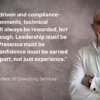
There have been many articles written recently about Leadership Development, and with good reason.
Leadership development is the process by which companies first identify individuals within their organizations who have the potential for leadership, and then provide them with the resources and training they need to grow into those positions and have a positive long-term impact on the organization.
Done well, Leadership Development can have a multitude of positive effects on an organization’s performance, including long term financial stability that becomes even more important during times of intense competitive challenge and uncertainty.
One recent industry survey that was conducted across a wide variety of companies quantified the benefits of a well-executed Leadership Development program in these key performance areas:
- 58% increase in employee engagement
- 48% increase in customer satisfaction
- 42% increase in customer retention
- 25% increase in employee retention
They went on further to show just how significant the cost of ineffective leadership can be on the bottom line:
- Poor leadership practices cost companies an amount equal to 8% of annual revenues
- 32% of an organization’s employee turnover can be avoided through better leadership
- Better leadership can generate a 3%-4% improvement in customer service
- Most organizations operate with a 5%-10% productivity drag that better leadership practices could eliminate
It’s no surprise that leadership development earns a top spot year after year on organizations’ talent priority lists, and that collectively companies spend tens of billions of dollars annually on programs meant to improve their bottom lines and prepare them for long term success.
Unfortunately, even with the higher level of focus and all the dollars spent, Leadership Development on balance lags way behind expectations.
A recent HBR article on the future of Leadership Development, cited that leadership development was in what they consider to be “a state of upheaval”. They go on
further to say that more than 50% of senior leaders believe their talent development efforts don’t build critical skills and organizational capabilities.
One recent industry study of mid-large company CEO’s found that only two thirds of those companies surveyed have an actual dedicated leadership development program in place, and nearly two thirds of those organizations believed their leadership development efforts were ineffective. One third of the companies surveyed felt their programs were doing a poor job of preparing leaders for the challenges of the future.
There isn’t enough space or time here to cover all the challenges and opportunities for improving corporate training and executive development, but here are several fundamental suggestions to consider when evaluating your leadership development strategy.
Are you doing an effective job of measuring the inventory of talent within your own organizations?
All too often, promotions are extended to employees based on their previous level of performance as individual contributors, or their strength of personality makes them appear to be ideal candidates for leading a team, only to find out too late they weren’t ready or suited to the new role and responsibilities.
Utilizing the services of a talent optimization platform like PI Behavioral Assessment™, can not only help you reduce the likelihood of costly promotion and hiring mistakes, but also help identify those employees with a high degree of aptitude for leadership potential that aligns with your company strategy, culture, and values.
Is leadership development in your organization a transformational process or an episodic experience where you hope to impart some short-term tactical wisdom, or a combination of the two?
It’s important to decide upfront, because sustainable, long term positive change takes time and commitment to fully realize its potential.
Whatever path you choose, make sure that your leadership development program emphasizes not only the technical skills required to tackle and solve today’s technical challenges, but also the more transformative leadership skills associated with self-awareness, curiosity, humility, and empathy. These will have a more meaningful impact on the wider universe of team members who themselves are looking to grow in their roles and perhaps become leaders themselves one day.
The solution is also not a one- or two-day skills development seminar, but a process of sustainable commitment using direct workforce on-the-job engagement and training, persistent e-learning accessibility and support, and coaching.
In a number of recent surveys, C-suite executives pointed out there was a significant gap in the capacity of the leaders in their organizations to coach those who report to them.
That concern is not surprising when you consider that any team, in any field, that has a coach who is either absent or focusing more on themselves than the performance and support of their team members will eventually erode the very ingredients that make a team and their ability to achieve great things so critical to an organization’s success.
We’re entering an age of massive complexity that will require a whole new generation of strong, thoughtful, confident, and caring leadership. It’s time that companies move beyond leadership development systems and processes that may have worked in the past, and instead focus on the collaborative interpersonal skills necessary to succeed in today’s networked, team oriented corporate cultures.
With all this knowledge on ROI, it is surprising most organizations and leaders have a company vision and financial strategy but few have a leadership or talent strategy. MCG has worked with organizations across industries to address their future needs with our years of research, best practices and with industry experienced consultants. We would love to share with you a new approach on today’s leadership and talent needs.
Click here to learn more www.mcgpartners.com
Please join Riley at NEHRA’s Webinar Series: Leadership Development and It’s Impact on Organizational Performance Presented by MCG Partners
Thursday, June 20th 1:00 pm to 2:00pm
Click here to register for the webinar.
Non-members can use the code MCGWebinar to register for no charge.
About the Author: Riley McDough
About MCG Partners:
MCG Partners is a leadership and talent optimization firm– aligning your business and people strategy for maximum results. MCG Partners a woman-owned consultancy and is also a Predictive Index® (PI®) certified partner. To learn more please contact John Griffith at john.griffith@mcgpartners.com and at mcgpartners.com
[/fusion_text][/fusion_builder_column][fusion_builder_column type=”1_4″ layout=”1_1″ spacing=”” center_content=”no” link=”” target=”_self” min_height=”” hide_on_mobile=”small-visibility,medium-visibility,large-visibility” class=”” id=”” background_color=”” background_image=”” background_position=”left top” background_repeat=”no-repeat” hover_type=”none” border_size=”0″ border_color=”” border_style=”solid” border_position=”all” padding_top=”” padding_right=”” padding_bottom=”” padding_left=”” margin_top=”” margin_bottom=”” animation_type=”” animation_direction=”left” animation_speed=”0.3″ animation_offset=”” last=”no”][fusion_widget_area name=”avada-custom-sidebar-blogsinglepagesidebar” title_size=”” title_color=”” background_color=”” padding_top=”” padding_right=”” padding_bottom=”” padding_left=”” hide_on_mobile=”small-visibility,medium-visibility,large-visibility” class=”” id=”” /][/fusion_builder_column][/fusion_builder_row][/fusion_builder_container]








